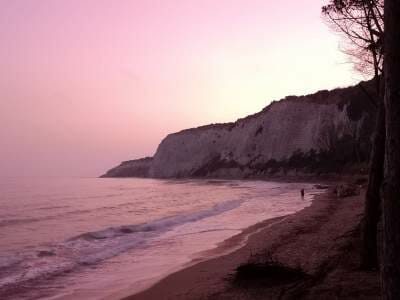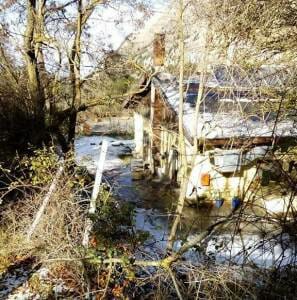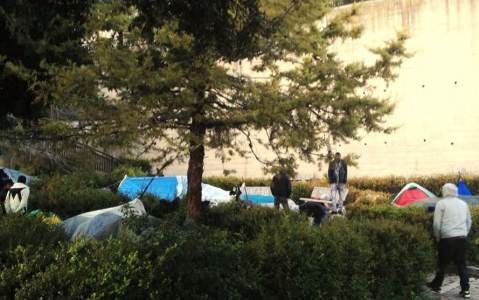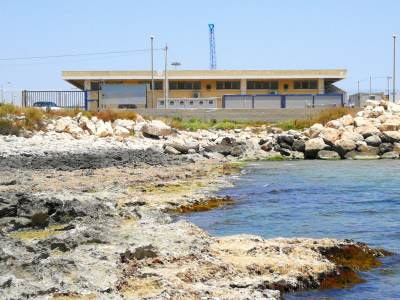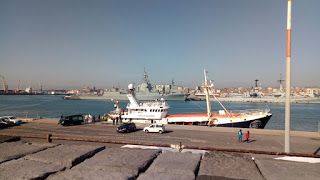Another summer of drowning and violations of human rights at the southern border of Europe
“I see boats like the one over there that are left at the coast,” he says and points to the last boat left after a so-called ghost landing, “and I think that the people who have arrived could be relatives of friends of mine, who are, like we all are, searching for a dignified life. Every time I come here my heart hurts.”
1Photo: Alberto Biondo
At the coast close to Agrigento, during the summer holidays, a late afternoon at the end of August. I am sitting down next to Abdulay, he sells grilled corn cobs at the beach. I have met him every morning on the camping grounds where he works, shy but proud. I saw him that evening, looking at the boat on the beach, one of many on which migrants from Tunisia arrive here. On his own, Abdulay starts to tell me of his experiences after arriving in Italy five years ago.
After his arrival in Sicily, he starts working at the market in Rome selling vegetables, while during the summer he is riding around Agrigento with his ‘grill bike’ which he built in only three hours: “At home I was a welder. I have two kids, five and eight years old. The second one I have only seen for two months. To feed my family I went on a boat. Luckily I did not die. I work to feed my family like every father in the world. In Rome, I am working twelve hours a day and I need my holidays to work over the summer as well to be able to continue sending home money. I have been inspired by Mexican street vendors to do this. In Mexico, grilled corn cobs with salt and lemon are a classic dish. I have spent 35 Euros for the metal parts and converted the bike. And so I am riding my bike back and forth between Eraclea and Punta Bianca, the place of my arrival in Italy, up and down the coast of Agrigento. Today everything is more difficult and many leave their children as orphans.”
We are sitting in silence, waiting for the sunset, our gaze tethered to the boat that has brought forty people to safety. I wish Abdulay all the best when we say goodbye. He shows me pictures of his children. With pride he points out to me that they have his eyes. He asks me that if I believe in any god to pray for his children as often he is too tired to do it himself in the evening.
The War on NGOs
During this summer, which for many people was a catastrophe, we again had to witness the cruelty of the Italian and European politics that continue to be responsible for death and exploitation. The numbers are clear: since the beginning of this year around 54 000 people have migrated to Europe – only 5000 of these to Italy. The political propaganda wants us to believe that Italy is the goal for these migrants. Yet less than 10% of these landings in Italy are made possible by NGOs – less than 300 people – numbers that can only be called ridiculously small. In contrast to this, no one speaks of the independent or ghost landings – while migrants that are rescued by NGOs are caught in the crossfire of Italian and European political power play.
During the current government crisis, migrants on board of the “Eleonore” belonging to the NGO Lifeline and on board of the “Mare Jonio” belonging to the NGO Mediterrania Saving Humans were not allowed to go on land in Italy due to a decree of a dissolving government. Although the permit was granted today, the gambling with migrants’ lives goes on; women, men, and children continue to be used for fear mongering. At the same time, ghost landings are taking place of which no one speaks: in the night of August 28th 78 people arrived on a small twin-engine boat and today some hundred migrants from Tunisia – all of them arriving on Lampedusa.
The fight against NGOs is not fought because they are rescuing people but because they criticize, because they want to draw attention to the situation in the Mediterranean, where dead have to be mourned daily, as happened most recently on August 27.
As if all of this was not enough, Italy has decided that NGOs are not allowed to do their surveillance flights. The actual aim here is to be able to deport, repatriate, and letting drown without any repercussions, without people knowing of this, and the continuation of their propaganda. A cruel murderous policy, that while preaching the gospel, madonna, and beads, implements devilish policies instead, practicing a new type of fascism that is specific to our times. Nevertheless, a majority of the legal courts continues to follow the rule of law and respects the fundamental values set out in our constitution and international agreements. The investigating judge of Agrigento did not confirm the state attorney’s request to confiscate the ship of Open Arms. Subsequently, criminal charges have been filed based on the crime of rejecting an official order!
Meanwhile on Lampedusa…
The quality of the reception centers and practices for migrants is being continually reduced and left to chance depending on the respective events. The most obvious example for this is Lampedusa, where people – as a report of the newspaper “Repubblica” has shown – live under unacceptable circumstances. As we have pointed out for a long time, not all of the emergency supplies and phone cards (to notify family that people are still alive) have been distributed. The installed phones are not working, the canteen is not existing any longer. People are eating sitting on the ground or on mattresses after having spent hours standing in line under the blazing sun. The hygiene conditions are embarrassing – and all of this after having switched the operating company for the umpteenth time. On August 6 the operating company Badia Grande has started to work. Badia Grande has already managed all kinds of federal reception centers – from Hotspots to CIE* and CPR*. The current operation is not at all different from the previous situation when it was run by Facility Service and Nuova Generazione. This center is constantly overcrowded because the ministry of the interior has an interest in creating tensions and problems in Lampedusa, similarly to what the previous government has done all these years.
… and its surroundings
In other deportation camps migrants are alternately ‘parked’ and used for the schemes of a variety of European governments. We remember, for example, that 70 people rescued by Open Arms were brought to Pozzallo. 15 of them were brought to Spain on a ship of the Spanish navy only a few days later. That meant additional days on sea for 15 unlucky, who were chosen in a game of roulette. The people rescued by the Gregoretti a month ago are still at the Hotspot of Pozzallo, waiting for the end of the negotiations on their distribution to different European nations. Bureaucratic negotiations take a long time, the waiting periods become indefinite and many end up in flight, which puts the migrants at risk to become victims of human traffickers again, who are profiting from this situation.
The creation of these “invisible” is a tactic in which the governments excel – it is a gift to the Italian mafia and to all of those who want to employ the cheapest of labor. Employees of centers for unaccompanied minors and of shared accommodations report that the chaos of caring for these unaccompanied minors is total: no coordination between ministries and the local authorities and institutions, annulments of transfers, splitting up of families, senseless transfers and unacceptable working conditions for social workers. From this situation teenagers also take flight and are put at risk. Especially teenagers from Tunisia leave these centers again after a few days.
There is Dying in Summer as well
It is summer – but the dying does not take a break. People are dying on all migrant routes to Europe: in the desert, in Libya, at sea. As has been reported already, Tunisia is fulfilling its role as border patrol in a violent and exploitative manner. An underage boy who has just arrived told us that he was taken up by the Tunisian coast guard and brought to a center of the Red Cross with two adults. After two months he was kicked out and became a victim of ruthless people, suffering from hunger and thirst. Later, human traffickers enabled him to flee by boat.
We also want to remember Elisa – an eight-year-old girl from Syria. Her short life ended because her father could not save her on sea. He desperately asked us on the phone who he had to contact to find the body of his daughter. He did not want to leave her behind on the bottom of the ocean. He himself, together with his brother and many others, has been brought back by the Libyan coast guard.
Elisa’s father and Abdulay, both ask us to pray for their children. They went on this journey for their children and for their children they searched for a better life. And we are keeping them from doing so by assuming an ominous power over the life and death of other people.
Alberto Biondo
Borderline Sicilia
*CIE Centro Identificazione ed Espulsione: deportation camp
*CPR Centro per il Rimpatrio: repatriation center
Translation: Annika Schadewaldt

